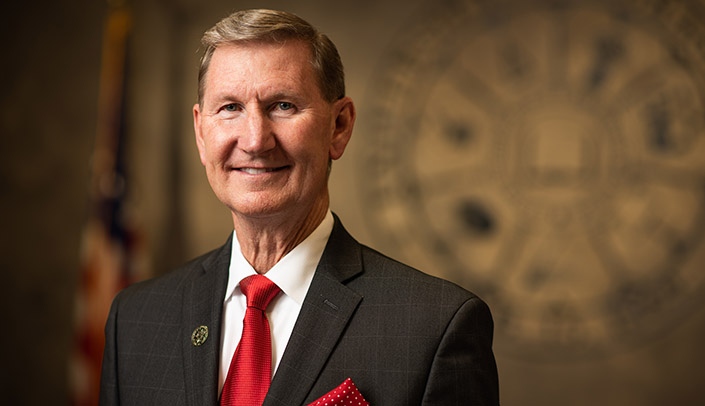Calling them "bold ideas with big impact for Nebraskans," University of Nebraska System President Ted Carter today presented a series of university proposals focused on workforce development, health care, and research and innovation for state leaders to consider for American Rescue Plan funding.
Carter, in testimony before the Legislature’s Appropriations Committee, said the federal relief dollars present a unique opportunity to invest in initiatives that will not only help Nebraska recover from the pandemic, but grow the state’s economic competitiveness and quality of life for generations to come.
See the president’s proposals for each university.
"The chancellors and I have spent months talking about what we as Nebraska’s public university system could bring forward that would have the most meaningful and long-lasting impact for the people of our state," Carter said. "These are once-in-a-lifetime opportunities to change the trajectory for Nebraska for years to come – solutions our university is uniquely positioned to deliver.
"We look forward to working closely with our elected leaders in the weeks and months ahead to advance our state through strategic use of these recovery dollars."
The university’s proposals regarding UNMC include:
UNMC Global Center for Health Security: The Covid-19 pandemic has exposed gaps in health systems’ abilities to mitigate emerging health threats. UNMC’s Global Center for Health Security is a recognized leader in preparing health systems for disease and pandemic threats, but additional investment would accelerate the center’s work in anticipating, preparing for, and mitigating emerging infectious diseases.
"The university’s proposals for UNMC would be a terrific investment for these one-time funds. Rural health education, expanding pancreatic cancer research, and growing our global health security programs are among the highest priorities of the University of Nebraska Medical Center," said UNMC Chancellor Jeffrey P. Gold, MD. "The funding in these areas would help UNMC truly transform even more of the lives of Nebraskans and beyond."
UNK-UNMC Rural Health Complex: Building on the successful UNK-UNMC collaboration that resulted in the Health Science Education Complex in Kearney, the new Rural Health Complex would significantly expand capacity for students in a range of health fields to train at UNK and remain in rural Nebraska after graduation. Quality, accessible health care is essential to the survival of rural communities, but Nebraska faces urgent workforce shortages. All counties except Douglas and Lancaster are designated as shortage areas for at least one type of primary care, for example, and there is high demand for more primary care physicians, nurses, dentists and allied health professionals. The need for greater mental health services is acute. The new health complex would create a nationally unique model for training and delivering the rural healthcare workforce.
"This is a tremendous opportunity for us to move forward and make a huge difference in rural Nebraska," said UNK Chancellor Doug Kristensen. "It is an initiative, a world-class medical center and national model that would move the needle in many areas and change health care for years to come. We are doing something different than everybody else."
UNMC Pancreatic Cancer Research Institute: Pancreatic cancer remains one of the most lethal forms of cancer, with a five-year survival rate of just 5 to 10 percent. UNMC scientists have made important breakthroughs, but much more work is needed. The new Pancreatic Cancer Research Institute, a public-private partnership, would expand early diagnosis and treatment research, with the goal of detecting pancreatic cancer at an earlier stage and improving therapies for patients.
The university also supports a proposal from the Nebraska chambers of commerce to invest in a new statewide internship initiative in partnership with philanthropic entities.
